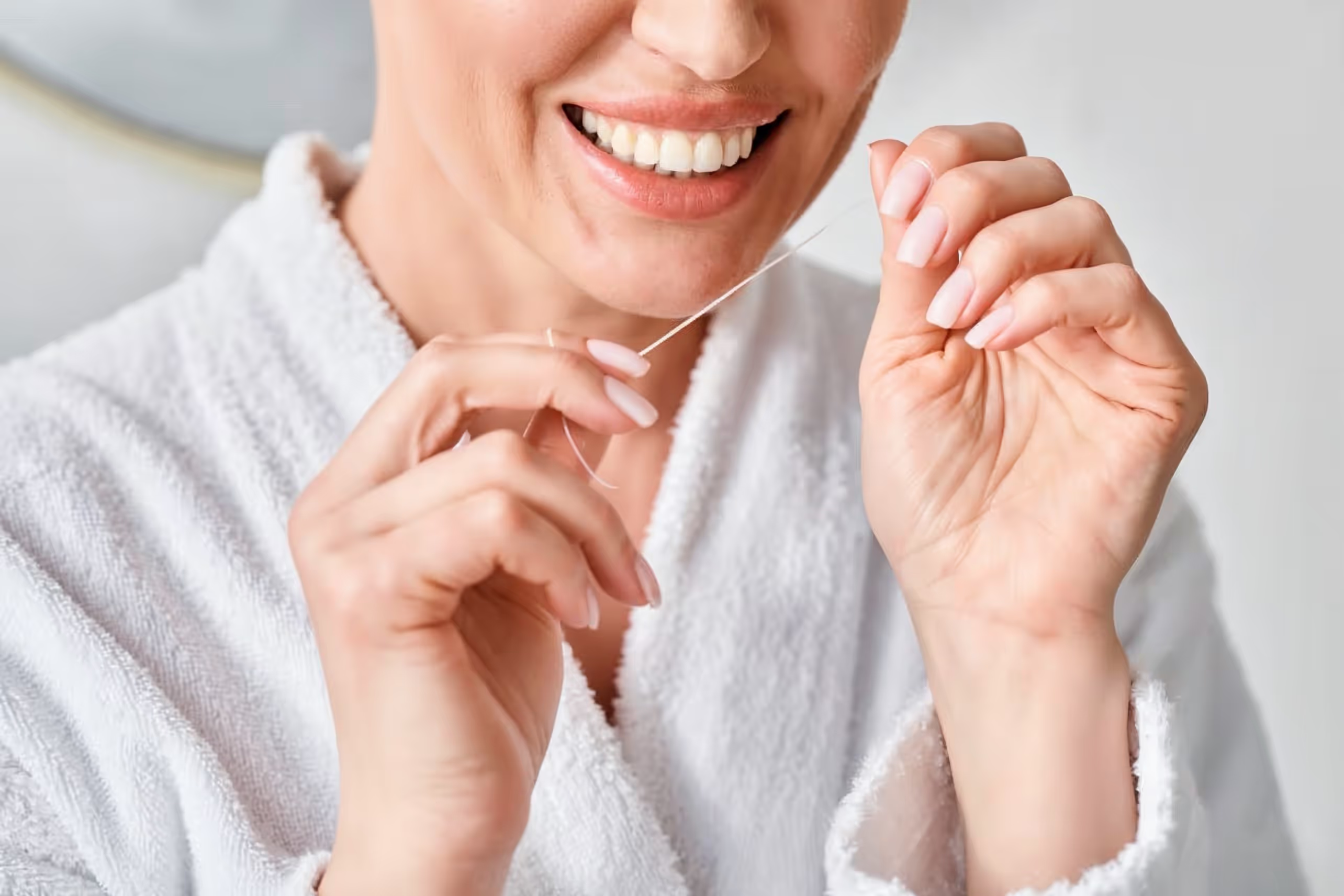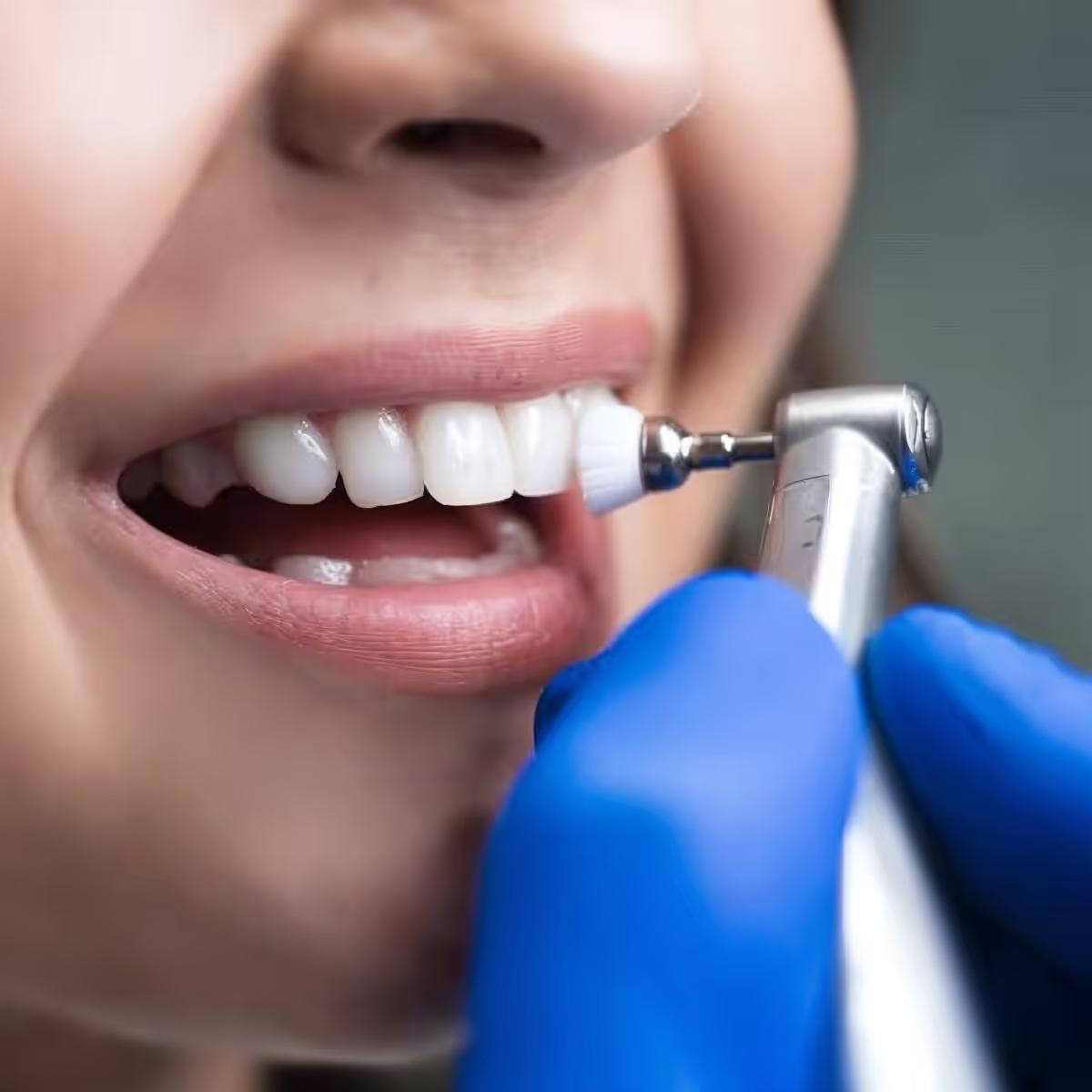



Professional oral hygiene is a quick, effective, painless procedure and a key preventive measure to help you maintain a healthy and beautiful smile, reduce tooth sensitivity, and protect your teeth from tooth decay and periodontitis. Regular treatment every 6 months prevents a wide range of dental and gum diseases and helps to detect dental problems at an early stage of their formation. Dental problems that are resolved in time do not require complex treatment, saving you health and money.
Professional oral hygiene at "Šypsenos Akademija" is performed using the "Air Flow" method. This is an innovative equipment procedure for professional oral hygiene. Using a strong stream of air, water and baking soda, it quickly, thoroughly and painlessly removes all the plaque accumulated on the surface of the teeth and provides protection against tooth decay and other oral diseases. This method will leave your mouth feeling pleasantly comfortable and clean.
.avif)
As a general rule, it is recommended that patients undergo professional oral hygiene regularly every 6 months. However, the frequency of the procedures depends on the patient's individual oral condition, the intensity of tartar accumulation, and the time and attention the patient devotes to dental care at home:
Esant netinkamiems burnos higienos įpročiams dantis prižiūrint namuose, apnašos ir akmenys kaupiasi daug greičiau. Spartesnį apnašų kaupimąsi taip pat skatina rūkymas ir dažančių maisto produktų vartojimas. Tokiais atvejais burnos higieną reikėtų atlikti kas 4 -6 mėnesius.
Sergantys periodonto ligomis, burnos higienisto paslaugomis turėtų pasinaudoti ne rečiau, kaip kartą per 3 mėnesius.
Pacientams, atliekantiems ortodontinį gydymą, dėl sudėtingesnės burnos higienos namuose, profesionali burnos higiena turėtų būti atliekama kas 3-4 mėnesius, siekiant išvengti uždegimų ir karieso susidarymo.
Pacientams, turintiems dantų implantus ir protezus, profesionali burnos higiena privaloma bent 2 kartus per metus. Jos nesilaikant, gali susidaryti infekciniai židiniai aplink implantus, kurie sukelia dantenų uždegimus, kaulo tirpimą ir net implantų praradimą. Reguliari priežiūra – tai ne pasirinkimas, o būtinybė, norint išsaugoti implantus ilgam.
It is the most effective preventive measure to ensure dental health. Dental plaque and bacteria are the main causes of tooth decay and periodontitis. Professional oral hygiene cleans the hard-to-reach areas of the teeth and interdental spaces that are difficult to access at home.
Laiku pastebimos dantų problemos dar ankstyvoje jų formavimosi stadijoje. Burnos higienistas atidžiai apžiūri paciento dantis, informuoja, jei burnos ertmėje pastebimi pakitimai ir reikalingas gydymas.Ilgai užsilikiusios dantų apnašos virsta dantų akmenimis, kurie dirgina dantenas ir atrodo neestetiškai. Dėl šių sankaupų ilgainiui dantenų audinys ima nykti ir sąlygoja danties netekimą. Periodiškai atliekama profesionali burnos higiena užkerta kelią dantų akmenų susidarymui.
Esant prastai burnos ertmės būklei gali susiformuoti dantenų uždegimas. Tokiu atveju pacientas profesionalios burnos higienos metu gali jausti nemalonius pojūčius, todėl esant poreikiui atliekama nuskausminimo procedūra. Tokiu atveju profesionalios burnos higienos metu pacientas nejaus jokio diskomforto.
Procedūros metu burnos higienistas suteikia išsamią informaciją apie dantų priežiūrą namuose ir pačias efektyviausias priemones pagal paciento individualią burnos ertmės būklę.


The professional oral hygiene procedure at the Šypsenos Akademija is carried out according to each patient's individual situation and needs:

Preventive oral hygiene;

Oral hygiene for patients with periodontal disease;

Oral hygiene for patients with dental implants or dentures;protezus;

Oral hygiene for patients wearing fixed arch dentures;

Oral hygiene for children;dantų tiesinimo kapas;

Profesionali burnos higiena vaikams;

Oral hygiene for patients with sensitive teeth;

Oral hygiene before laser teeth whitening or other cosmetic dentistry procedures.dantų balinimo procedūrą ar kitas estetinės odontologijos procedūras.
Profesionali burnos higienos procedūra trunka vos 60 - 75 minutes, priklausomai nuo paciento individualios burnos ertmės būklės ir amžiaus . Procedūra susideda iš kelių žingsnių.
The oral hygienist carefully assesses the patient's dental condition and determines whether treatment is needed.
Naujai atvykusiems klinikos pacientams atliekamas skaitmeninis dantų būklės tyrimas (skenavimas). Šio tyrimo metu galima detaliai įvertinti kiekvieno danties būklę, aiškiai parodyti pacientui esamas problemas bei aptarti tolimesnį gydymo ar profilaktikos planą.
Hard and soft plaque is removed from all tooth surfaces and periodontal pockets using an ultrasonic scaler, instruments and the "Air Flow" method.
The teeth are polished with special brushes, rubber discs and polishing paste.
The oral hygienist provides recommendations on the appropriate measures for the patient's individual dental condition for proper dental and oral care at home.
We assess each case individually and adapt to the financial possibilities of the patient. For this purpose, an extremely flexible system of payment for services is applied. Do not delay treatment because of finances, we assure you - together we always find a compromise.
Jūsų patogumui bendradarbiaujame su privačiomis sveikatos draudimo kompanijomis, todėl viskas bus dar greičiau ir patogiau, o jei tiesioginio bendradarbiavimo su jūsų draudimo kompanija neturime, po paslaugos suteikimo galėsime pateikti medicininį išrašą ir sąskaitą faktūrą.







Professional dental cleanings are generally recommended every 6 months. However, the frequency depends on each patient’s individual oral health, the rate of tartar buildup, and their at-home hygiene habits. For some, cleanings may be necessary every 4 months. Patients with periodontal disease should have a cleaning at least every 3 months. Those undergoing orthodontic treatment should schedule cleanings every 3–4 months.
Yes. Even with excellent oral care, it’s impossible to remove all plaque and bacteria at home. That’s why a professional cleaning every 6 months is still recommended.
No. Mouthwash helps slow plaque formation but does not remove it. Proper brushing, flossing, and the use of interdental brushes or other tools—recommended by your dental hygienist based on your individual case—are necessary.
Therapeutic mouthwashes are prescribed to serve specific purposes—such as treating inflammation, oral sores, or tooth sensitivity. Your dental hygienist will explain which product is best for you during your hygiene appointment.
Ne. Skalavimo priemonės tik sulėtina apnašų ir akmenų atsiradimą, tačiau norint juos panaikinti reikia itin kruopščiai valyti dantis, naudoti tarpdančių siūlą, vieno danties bei liežuvio šepetėlius ir kitas priemones. Profesionalią higieną atliekantis specialistas, atsižvelgdamas į individualią paciento būklę, visada pataria, kokios burnos priežiūros priemonės turėtų būti naudojamos.
Gydomasis skalavimo skystis neretai yra skiriamas tuomet, kai turi atlikti tam tikrą funkciją – gydyti uždegimą, žaizdeles burnoje, sumažinti dantų jautrumą ir kt. Apie burnos skalavimo skysčius ir kokį skystį kaip papildomą burnos priežiūros priemonę rinktis -geriausiai plačiau papasakoja burnos higienos paslaugas teikiantis specialistas.
Yes. Coffee, tea, red wine, tobacco, and other staining substances can cause pigment-rich plaque to form more quickly.
Not necessarily. Bad breath is often caused by bacteria and plaque trapped between teeth, on the tongue, or in gum pockets. During a professional cleaning, the hygienist will assess your oral health and determine if treatment is needed.
Yes, the procedure can be performed for children once their teeth have erupted.
Generally, no. If you have sensitive teeth, you may experience mild discomfort. In such cases, anesthesia can be provided to ensure a painless procedure.
It is recommended to avoid eating, drinking staining beverages (coffee, tea, sodas, wine), or smoking for 3 hours after the procedure.
You should visit a dental hygienist every 6 months. Immediate visits are recommended if you notice signs of gum inflammation or periodontitis. Cleanings are especially important before orthodontic treatment, teeth whitening, implants, prosthetics, or root canal therapy.dantų balinimą, dantų implantavimą, protezavimą ar kanalų gydymą bei visas chirurgines intervencijas.
Yes. Mild discomfort, sensitivity to heat or cold, and slight gum bleeding are normal for a few days after a professional cleaning. Use a soft-bristled toothbrush and a sensitivity-reducing toothpaste. These symptoms usually subside within two days, and your mouth fully recovers within two weeks. If discomfort persists, contact your dental clinic.








Don't miss out — take advantage of exclusive offers!